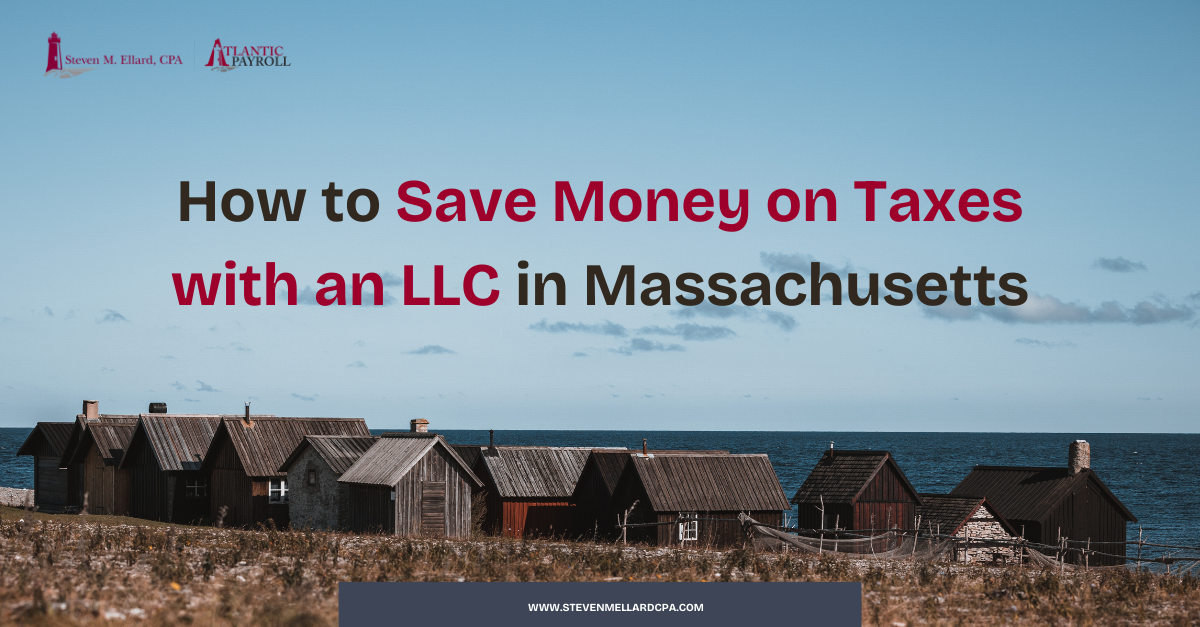If you’re starting a business in Massachusetts or already running one, you’ve probably come across the terms “LLC” and “S Corp.”
And maybe you have wondered: is there anything you can do as an LLC to save money on taxes?
The answer is yes.
By understanding how LLC in Massachusetts work and when it makes sense to elect S Corp status, you can potentially cut your self-employment taxes and keep more of your profits.
In this article, we will walk you through how LLCs and S Corps work in Massachusetts, what makes them different (and what does not), and how to make the right decision for your business setup and taxes.
First: An S Corp is not a legal structure
This is where many people get confused.
When you form a business in Massachusetts, you’re choosing a legal structure. That might be a sole proprietorship, a partnership, a corporation, or an LLC.
An LLC, short for Limited Liability Company, is a legal structure. It’s something you file with the Secretary of the Commonwealth to officially form your business. It creates a legal separation between you and your business, which is a good thing. It means your personal assets are generally protected if your business is ever sued or ends up in debt.
But here is the key point. An S Corporation is not a business structure you can form. It is a tax election. You request it from the IRS, not from the state.
You are essentially telling the IRS, “I want my business to be taxed like an S Corporation,” even though legally, you might still be an LLC. That means your business could be both.
You could have an LLC in Massachusetts that is taxed as an S Corp.
Find out whether your community qualifies in our article, Are Homeowners Associations Tax-Exempt?
The real difference: taxes
If you are a single-member LLC in Massachusetts and do not make any special elections, the IRS treats you like a sole proprietor. All your business income flows directly to your personal tax return, and you pay income tax and self-employment tax on the profits.
Self-employment tax is the big one here. It covers Social Security and Medicare and is about 15.3% on your net income. That adds up quickly if your business is doing well.
When you elect S Corp status, things work differently. You are required to pay yourself a “reasonable salary” as an employee of your business. You will pay payroll taxes on that salary just like any other W-2 employee.
Any remaining profit, after that salary, is considered a distribution. Distributions are not subject to self-employment tax.
That is where the potential tax savings come in. By splitting your income between salary and distributions, you can reduce how much you owe in self-employment taxes.
Of course, this is not just free money. You also take on more complexity. You will need to run payroll, file extra tax forms, and follow IRS rules more carefully as a LLC in Massachusetts.
What does Massachusetts require?
Regardless of whether you’re an LLC or an S Corp, Massachusetts has its own set of rules. If you form an LLC in Massachusetts, you’ll need to file with the Secretary of the Commonwealth and pay an annual report fee.
That’s currently $500 per year for LLCs.
If you elect to be taxed as an S Corp, you’ll also need to file an S Corporation return with the state in addition to the federal one.
And Massachusetts has something called a “minimum excise tax” on S Corps, which is important for any LLC in Massachusetts electing S Corp status. That tax is at least $456 per year, but it can be higher depending on your business income.
So it’s not just about choosing between one or the other. You’ll want to weigh the federal tax benefits against the state-level costs and paperwork.
When does switching to an S Corp make sense?
The short answer is: when you’re making enough profit to benefit from the tax savings.
The long answer takes a little more unpacking.
Because with an S Corp, you’re required to run payroll for yourself, which is a key consideration for any LLC in Massachusetts. That means using payroll software, issuing W-2s, paying payroll taxes, and filing quarterly reports. If your business isn’t making enough to justify that added work and expense, you’re not saving money, you’re just adding complexity.
A lot of accountants use a ballpark threshold of around $75,000 to $100,000 in annual net income. That’s not revenue, but profit after expenses. If you’re below that number, the tax savings usually aren’t big enough to outweigh the extra costs.
If you’re above it, it might be time to take a closer look.
And remember: you have to pay yourself a “reasonable salary.” You can’t just say, “I’m taking a $10,000 salary and the rest is tax-free.”
The IRS expects your salary to be in line with what someone else in your role would earn. If you lowball it too much, you could face penalties or reclassification later.
What are the downsides of choosing S Corp status?
S Corps come with a few strings attached.
First, once you make the election, you have to stick with it. You can’t flip back and forth every year. It’s not a casual decision; it’s something you need to commit to and maintain.
Second, you’re required to treat your business more like a formal company, which is an important consideration for any LLC in Massachusetts. That includes setting up payroll, maintaining proper accounting records, holding meetings if you’re incorporated, and being more deliberate about how and when you take money out of the business.
And third, you’ll have extra tax filings. Instead of filing a simple Schedule C with your personal return, you’ll need to file an S Corporation tax return (Form 1120S), issue W-2s, and possibly file separate state forms for both the business and yourself.
That usually means hiring a Massachusetts CPA or tax professional to handle it all.
What we recommend
If you’re just starting out and not sure how profitable your business will be, it often makes sense to start with an LLC and wait. You can always elect S Corp status later.
In fact, the IRS lets you make the election retroactively for a portion of the year, as long as you meet certain deadlines.
Once your business is reliably profitable — think $75,000 or more in net income — it’s worth running the numbers. You might be able to save several thousand dollars per year in self-employment taxes.
But make sure you’re also ready for the increased responsibilities.
And don’t forget the Massachusetts angle. With state-level excise taxes and filing fees, it’s not just about federal taxes. You’ll want to make sure the numbers work locally, too.
How our Business Foundation Program helps
Choosing the right entity and knowing when to elect S Corp status can save you thousands in taxes. It also sets your business up for long-term success.
That is why we created our Business Foundation Program.
This program helps Massachusetts business owners with everything from entity selection and QuickBooks setup to payroll, tax compliance, and ongoing advisory support.
Instead of trying to figure it all out on your own, you will have an advisor by your side to guide you through the process.
Next steps
At Steven M. Ellard, CPA, we help small business owners across Massachusetts figure out the right structure for their business, their income, and their future plans.
Our Business Foundation Program is designed to make sure you start with the right setup and stay on track as your business grows.
If you are wondering whether an S Corp is the right move or how to save money as an LLC, book a discovery call today.
We will walk you through your options and make sure your business is built on the strongest foundation possible.
Until next time.







